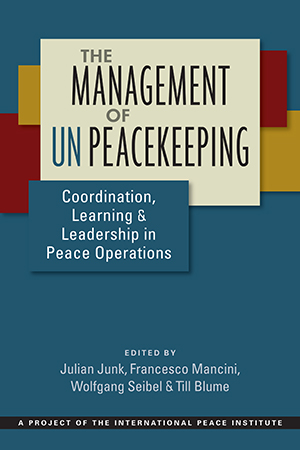
- 2017/433 pages
- A Project of the International Peace Institute
The Management of UN Peacekeeping:
Coordination, Learning, and Leadership in Peace Operations
Hardcover: $85.00
ISBN: 978-1-62637-585-7
Paperback: $35.00
ISBN: 978-1-62637-586-4
Ebook: $35.00
ISBN: 978-1-62637-672-4
This groundbreaking book brings the insights of organization and public administration theories to the analysis and enhancement of complex peace operations. Focusing on three essential and interrelated aspects of organizations—coordination, learning, and leadership—the authors bridge the gap between research on UN peacekeeping and the realities confronted both in the office and in the field.







